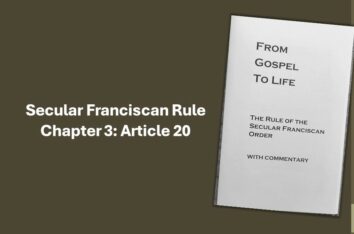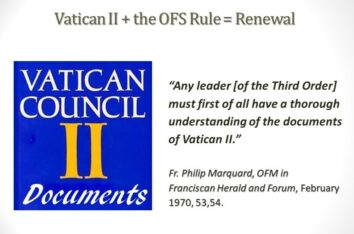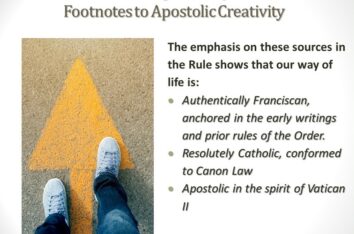There are three stages that should normally be followed in the reduction of social principles into practice.
- First, one reviews the concrete situation;
- Secondly, one forms a judgment on it in the light of these same principles;
- Thirdly, one decides what in the circumstances can and should be done to implement these principles.
These are the three stages that are usually expressed in the three terms: look, judge, act. (Christianity and Social Progress #236 Pope St. John XXIII-1961)
Our Rule inspires us to develop the qualities we need to be successful
- Build relationships with others
- Listen without prejudice
- Don’t blame others
- Give yourself time to think before you speak
- Don’t assume
Respect – Love – Empathy – Compassion
When Differences Arise…
238. Differences of opinion in the application of principles can sometimes arise even among sincere Catholics. When this happens, they should be careful not to lose their respect and esteem for each other. Instead, they should strive to find points of agreement for effective and suitable action, and not wear themselves out in interminable arguments, and, under the pretext of the better or the best, omit to do the good that is possible and therefore obligatory.
239. In their economic and social activities, Catholics often come into contact with others who do not share their view of life. In such circumstances, they must, of course, bear themselves as Catholics and do nothing to compromise religion and morality. Yet at the same time, they should show themselves animated by a spirit of understanding and unselfishness, ready to cooperate loyally in achieving objects which are good in themselves or can be turned to good. Needless to say, when the Hierarchy has made a decision on any point Catholics are bound to obey their directives. The Church has the right and obligation not merely to guard ethical and religious principles, but also to declare its authoritative judgment in the matter of putting these principles into practice.
(Christianity and Social Progress #238 &239 Pope St. John XXIII-1961)
• How have you learned to build relationships in your family? At work? In your fraternity?
• Can you think of times when respect, love, empathy, and compassion were in short supply on your part? How could you have done better?
Las relaciones: edificando una sociedad justa
Decidir cómo manejar los asuntos sociales:
Observar – Juzgar – Actuar
O- Examinar la situación.
J- Evaluar la situación según la enseñanza social católica.
A- Decidir lo que se puede y se debe hacer
Hay tres etapas que normalmente deben seguirse en la reducción de los principios sociales a la práctica. Primero, uno revisa la situación concreta; en segundo lugar, se forma un juicio al respecto a la luz de estos mismos principios; tercero, uno decide qué circunstancias pueden y deben hacerse para implementar estos principios. Estas son las tres etapas que generalmente se expresan en los tres términos: observar, juzgar, actuar. (Cristianismo y progreso social # 236 Papa San Juan XXIII-1961)
Nuestra regla nos inspira a desarrollar las cualidades que necesitamos para tener éxito.
1. Construir relaciones con otros
2. Escuchar sin prejuicios
3. No culpar a los demás
4. Tomar tiempo para pensar antes de hablar
5. No asumir
El respeto – El amor – La empatía – La compasión
Cuando surgen las diferencias …
238. Las diferencias de opinión en la aplicación de principios a veces pueden surgir incluso entre católicos sinceros. Cuando esto sucede, deben tener cuidado de no perder el respeto y la estima entre ellos. En cambio, deben esforzarse por encontrar puntos de acuerdo para una acción efectiva y adecuada, y no agotarse en argumentos interminables y, con el pretexto de lo mejor o lo mejor, omitir hacer el bien que es posible y por lo tanto obligatorio.
239. En sus actividades económicas y sociales, los católicos a menudo entran en contacto con otros que no comparten su visión de la vida. En tales circunstancias, deben, por supuesto, comportarse como católicos y no hacer nada para comprometer la religión y la moral. Sin embargo, al mismo tiempo, deberían mostrarse animados por un espíritu de comprensión y desinterés, dispuestos a cooperar fielmente para lograr objetos que sean buenos en sí mismos o que puedan convertirse en buenos. Huelga decir que cuando la Jerarquía ha tomado una decisión sobre cualquier punto, los católicos están obligados a obedecer sus directivas. La Iglesia tiene el derecho y la obligación no solo de proteger los principios éticos y religiosos, sino también de declarar su juicio autoritario en la cuestión de poner en práctica estos principios.
(El Cristianismo y el progreso social # 238 & 239 Papa San Juan XXIII-1961)
• ¿Cómo has aprendido a construir una relación en tu familia? ¿En el trabajo? En tu fraternidad?
• ¿Puedes pensar en momentos en que el respeto, el amor, la empatía y la compasión eran escasos por tu parte? ¿Cómo pudiste haberlo hecho mejor?
Diane F. Menditto, OFS
Chair, National Formation Commission


